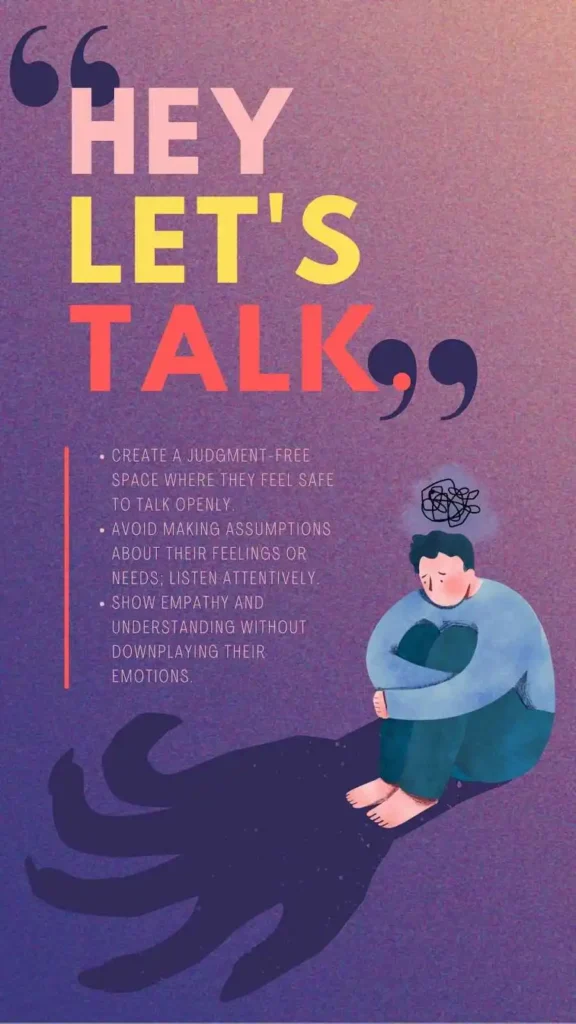TIPS
10 Things You Can Do to Help Someone With Depression

It’s tough to sit through an issue related to depression with someone close to your heart. You feel this urge to do something useful to support them, though you don’t know what that would be. You’re terrified of saying or doing the wrong thing. Depression is complex and often isolates those who experience it. However, being there and understanding means so much. Here are thoughtful ways to offer helpfulness, and connection, and make someone safe from depression.
Listen without judgment or offering a solution. There is probably no better way to help a person with depression than to listen. Do not interrupt and do not try to solve the problem. Depression cannot be “fixed” by giving advice. Your goal is not to provide answers but to give them space to share their feelings freely.
Let them talk without fear of judgment. Avoid invalidating their feelings when telling them things like “it is not that bad,” or “you will be able to get over this easily.” Instead, focus more on their feelings. Phrases showing support go by such as “sounds like really hard,” or “I am with you.”
Table of Contents
Listen Without Judging or Offering Solutions
Understanding depression is the key to effectively supporting someone. Learning about its symptoms, causes, and how it affects daily life can help you better empathize and approach the situation with more sensitivity.
Depression is not sadness. It can also include fatigue, irritability, and difficulty concentrating. The more you know about these aspects, the better you will understand them. The more you understand, the less likely you are to misinterpret their actions or minimize their struggles.
Encourage Professional Help
Though their support is invaluable, often professional help is needed in dealing with depression. Ask them to consult a therapist or doctors in any depression treatment centers. Assist them in finding therapists or support groups if they express interest.
Mind it and treat them right. Present it as doing something for themselves rather than something they “have to do” to improve. For instance, say, “Talking to somebody may help lighten the burden over their heads.” Keep talking so that they would not even be prepared enough at any moment, treating them with respect according to their pace and choice
Check-in regularly
Depression can sometimes make people feel invisible or forgotten. Simple actions like a text message, call, or visit can remind them that they matter. These things do not have to be very dramatic. A simple text, “Thinking of you today,” may be enough.
Consistency is key. Checking in regularly shows that your concern isn’t fleeting. However, balance your outreach with their need for space. Respect their boundaries while reminding them you’re available when they’re ready to talk or spend time together.
Help With Everyday Tasks
Depression leaves a person lacking the energy to perform some of the very basic things one has to do, such as cooking, cleaning, or running around and doing errands. Practical help helps lighten the burden on people and will show them you genuinely care.
Instead, ask not “What can I do to help?” but show them exactly. For instance, ask if they’d like you to have dinner at home some night this week, or let them know you’re happy to take grocery shopping off the list. Sometimes, these tiny acts can brighten their day and show how willing you are to help in this situation.
Tolerate Their Progress
Healing from depression isn’t a straight line. There are good days and bad days, moments when nothing seems to happen at all. Patience with meaningful support is key here.
Avoid showing frustration or disappointment if they appear to be stuck. Harmful statements are the kind that say, “You should be feeling better by now.” Instead, remind them that taking things one step at a time is okay. Celebrate the small victories, such as getting out of bed or attending an appointment; these are huge victories for a person with depression.
Build a Judgment-Free Environment
A depressed person needs a haven where they can talk freely without the apprehension of being judged. Let them know that they can freely express themselves to you.

Don’t assume you know what they need or how they feel. If they entrust you with this knowledge, listen carefully and refrain from the classic “everybody feels that way at some time or another” comment. Show your concern and understanding of their feelings.
Enforce Good Habits
Depression makes mountains out of molehills in simple tasks, but healthy habits can be presented as a way to help recover. Ideas include walking, trying a new hobby, or practicing mindfulness.
Be sensitive to their energy levels. Don’t force them. Ask them politely. For example, say “Do you want to walk for a little while?” instead of saying “You need to get out more.” This way you stress your independence and encourage good behavior.
Avoid Taking Their Behavior Personally
Depression may also affect the relationship that one person holds with others. Sometimes, people pull away and cancel plans, or are short with other people. Try not to take these symptoms as reflections of how they may feel towards you.
Try not to internalize their behavior or respond with anger. Instead, let them know you’re still there for them. A simple statement like, “I understand you’re going through a lot right now, and I’m here when you’re ready,” can reinforce your support without adding pressure.
Take Care of Yourself Too
It is emotionally very draining to support someone with depression. Therefore, one should take care of oneself to continue supporting the person. Set boundaries, so you don’t become burnt out, and consider reaching out to friends, family, or even a therapist if necessary.
Remember that you cannot pour from an empty cup. You have to take care of your mental health, which puts you in a position to support your loved one in the best way possible. Balance enables you to be present for them without feeling overwhelmed or resentful.
Conclusion
To help someone with depression one has to be patient, show them some empathy, and fully understand them. You might not know everything, but offering what you can sometimes become an important aspect in their journey to healing. Your constant care and urging on their part to seek professional help reminds him/her that he/she isn’t alone. Small acts of kindness and compassion brighten even the darkest of days.
FAQs
1. How can I support someone with depression if they don’t want to talk?
Be present without pressuring them to open up. Small gestures like sitting with them, sending a thoughtful message, or simply showing you care can provide comfort.
2. Is it okay to share my own struggles with them to help them feel less alone?
Sharing your experiences can be helpful if done thoughtfully. Keep the focus on them and avoid minimizing their feelings by comparing situations.
3. How do I know if I’m helping or making things worse?
Check-in with them regularly about how they feel supported. Open communication ensures you’re aligned with their needs and avoids unintentional harm.
-

 GENERAL6 months ago
GENERAL6 months agoChristofle – For Those Who Dream of Family Heirloom Silver
-

 SPORTS8 months ago
SPORTS8 months agoDiscover the World of Football with Streameast: Watch Your Favorite Leagues and Tournaments
-

 GENERAL5 months ago
GENERAL5 months agoUncovering the World of кинокрадко: The Dark Side of Film Piracy
-

 GENERAL3 months ago
GENERAL3 months agoATFBooru: Anime, Gaming, and Subculture Imageboard























